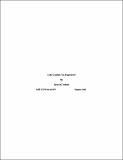| dc.contributor.author | Poterba, James M. | en_US |
| dc.date.accessioned | 2009-12-15T23:54:38Z | |
| dc.date.available | 2009-12-15T23:54:38Z | |
| dc.date.issued | 1990 | en_US |
| dc.identifier | 90-021 | en_US |
| dc.identifier.uri | http://hdl.handle.net/1721.1/50154 | |
| dc.description.abstract | Claims of the regressivity of gasoline taxes typically rely on annual surveys of consumer income and expenditures which show that gasoline expenditures are a larger fraction of income for very low income households than for middle or high-income households. This paper argues that annual expenditure provides a more reliable indicator of household well-being than annual income. It uses data from the Consumer Expenditure Survey to re-assess the claim that gasoline taxes are regressive by computing the share of total expenditures which high-spending and low-spending households devote to retail gasoline purchases. This alternative approach shows that low-expenditure households devote a smaller share of their budget to gasoline than do their counterparts in the middle of the expenditure distribution. Although households in the top five percent of the total spending distribution spend less on gasoline than those who are less well-off, the share of expenditure devoted to gasoline is much more stable across the population than the ratio of gasoline outlays to current income. The gasoline tax thus appears far less regressive than conventional analyses suggest. | en_US |
| dc.description.sponsorship | Supported by the National Science Foundation, the MIT Center for Energy Policy Research and the John M. Olin Foundation. | en_US |
| dc.format.extent | 28 p | en_US |
| dc.publisher | MIT Center for Energy and Environmental Policy Research | en_US |
| dc.relation.ispartofseries | Working paper (Massachusetts Institute of Technology. Center for Energy Policy Research) ; MIT-CEPR 90-021. | en_US |
| dc.title | Is the gasoline tax regressive? | en_US |
| dc.type | Working Paper | en_US |
| dc.identifier.oclc | 28596129 | en_US |
